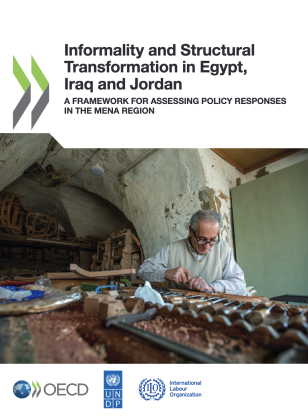Informality and structural transformation in Egypt, Iraq and Jordan
Informality and structural transformation in Egypt, Iraq and Jordan
June 11, 2024
Informality is a complex, multi-faceted phenomenon that encompasses a diverse array of activities, transactions, and individuals, operating largely outside formal businesses but, to a different extent, also inside them. It represents a critical, yet problematic component of global economic activity; that is: while informality can be a coping mechanism towards poverty alleviation when the economy is not producing enough formal jobs, high levels of structural informality expose economies to long-term vulnerabilities, which may be further reinforced when shocks hit them.
In light of the pervasiveness and persistence of informality in the MENA region and the increasing exposure to global and regional shocks, the ILO, OECD, and UNDP have joined forces to advocate for effective forward-looking policies in MENA countries that create resilience while considering their possible impact on formalisation.
This joint report reflects the work so far conducted, which involved:
- Desk research and a series of consultations with policy makers were conducted in a group of three countries, namely Egypt, Iraq, and Jordan, with a view to broadening the scope to more countries at a later stage of the joint activity. The analysis focused on the short and long-term impact of policy measures adopted in response to the COVID-19 pandemic.
- The preliminary conclusions were discussed at the ILO-OECD-UNDP Workshop on Addressing Informality in the MENA Region in Times of Shocks, held at the OECD Istanbul Centre in November 2022. The discussions reflected on how countries capitalised on emergency measures enforced during recurrent social and economic shocks to implement a long-term reform agenda to address underlying structural vulnerabilities of the informal economy and thereby gradually encourage formalisation.
- The elaboration of an original framework for assessing the impact of selected economic and social policies, particularly policy measures implemented as a response to the COVID 19 pandemic, on formalisation of jobs and businesses.

 Locations
Locations





